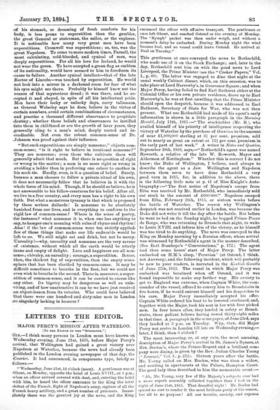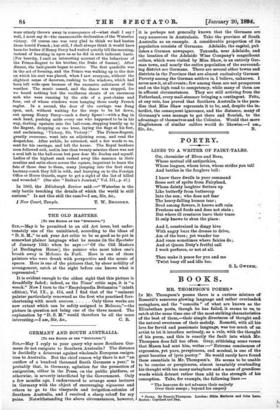LETTERS TO THE EDITOR.
MAJOR PERCY'S MISSION AFTER WATERLOO.
r To THE EDITOR OF TEN "SPECTATOR."]
think many persons in London must have known on Wednesday evening, June 21st, 1815, before Major Percy's arrival, that Wellington had gained a great victory over Napoleon at Waterloo, because the news had already been published in the London evening newspaper of that day, the 'Courier. It bad announced, in conspicuous type, briefly as follows -:— "Wednesday, June 21st,19 o'clock (noon). A gentleman was at 'Ghent, on Monday, opposite the hotel of Louis XVIII., at 1 p.m., when an officer arrived covered with dust, and, entering the hotel with him, he heard the officer announce to the King the total defeat of the French, flight of Napoleon's army, capture of all the French heavy artillery, and a great number of prisoners. Imme- fliately there was the greatest joy at the news, and the King embraced the officer with effusive transfort. The gentleman at once left Ghent, and reached Ostend in the evening of Monday. The 'Nymph' packet was then under weigh, and without a moment's delay he embarked. Daring Monday night the wind became foul, and no vessel could leave Ostend. He arrived at Deal on Tuesday."
This gentleman at once conveyed the news to Rothschild, who made use of it on the Stock Exchange ; and, later in the day, Rothschild sent him on with the good news to Lord Liverpool, the Prime Minister (see the " Croker Papers," Vol. I., p. 60). The latter was engaged to dine that night at the usual weekly Cabinet dinner, which, on this occasion, was to take place at Lord Harrowby's, in Grosvenor Square; and when Major Percy, having failed to find Earl Bathurst either at the Colonial Office or his own private residence, drove up to Earl Harrowby's, he was at first unwilling that the Prime Minister should open the despatch, because it was addressed to Earl Bathurst, Secretary of State for War, who was not then present. What use Rothschild had made of his agent's early information is shown in a little paragraph in the Morning Herald, July 11th, 1815:—" The stockholder (Mr. B), who availed himself of his priority of intelligence respecting the victory of Waterloo by the purchase of Oninium to the amount of near 21,000,000 sterling at 31 per cent, premium, sold out to nearly as great an extent at 121 per cent. 'premium in the early part of last week." A writer in Notes and Queries, September 19th, 1868, says,—" Rothschild's agent was named Roworth, a relative of the late W. Roworth, Mayor and Alderman of Nottingham." Whether this is correct I do not know; the Duke of Wellington, I believe, used always to describe the agent as a Jew. Wellington and Napoleon between them seem to have done Rothschild a very good turn in 1815, for, in addition to the above, there is the following little note at p. 41 of Miss Knight's Auto- biography :—" The first notice of Napoleon's escape from Elba was received by Mr. Rothschild, who immediately sold out stock to the amount of 2600 000." Napoleon escaped: from Elba, February 26th, 1815, or sixteen weeks before the battle of Waterloo. The reason why Wellington's despatch was not received earlier in London, was because the Duke did not write it till the day after the battle. But before he went to bed on the Sunday night, he begged Prince Pozzo de Borgo, who was returning to Brussels that night, to write to Louis XVIII, and inform him of the victory, as he himself was too tired to do anything. The news was conveyed to the King on Monday morning by a Russian officer, whose arrival was witnessed by Rothschild's agent in the manner described. (See Earl Stanhope's "Conversations," p. 172.) The agent had thus some hours' start of Major Percy. The latter embarked on H.M.'s sloop, Peruvian' (at Ostend, I think, not Antwerp), and the following incident, which will probably be new to your readers, is narrated in the Kentish Gazette of June 27th, 1815. The vessel in which Major Percy was embarked was becalmed when off Ostend, and it was found impossible to make any farther way. His anxiety to- get to England was extreme, when Captain White, the com- mander of the vessel, offered to convey him to Broadstairs in
five hours, if he would entrust himself and his despatches to his care. Major Percy immediately accepted his offer.
Captain White ordered his boat to be lowered overboard, and, together with the Major, took his seat in her with four picked men. In four hours after, they landed in safety at Broad- stairs, these gallant fellows having rowed thirty-eight miles in that time. A paragraph in the same paper, of June 23rd, says they landed at 3 p.m. on Tuesday. Why, then, did Major Percy not arrive in London till late on Wednesday evening,— later, I think, than 6 o'clock ?
The most interesting, or, at any rate, the most amusing, description of Major Percy's arrival in St. James's Square, at Mrs. Boehm's, where the Prince-Regent and a brilliant com- pany were dining, is given by the Rev. Julian Charles Young (" Journal," Vol. I., p. 212). Sixteen years after the battle, Mr. Young called on Mrs. Boehm, who was then a widow, and residing in apartments at the Palace, Hampton Court. The good lady thus described to him the memorable event :— "Ah, Mr. Young, very few of His Majesty's subjects ever had a inure superb assembly collected together than I had on the night of June 21st, 1815. That dreadful night ! Mr. Boehm had spared no cost to render it the most brilliant party of the season, but all to no purpose! all our trouble, anxiety, and expense.
were utterly thrown away in consequence of—what shall I say ? well, I must say it—the unseasonable declaration of the Waterloo victory. Of course one was very glad to think we had beaten those horrid French ; but still, I shall always think it would have been far better if Henry Percy had waited quietly till the morning, instead of bursting in upon us as he did in such indecent haste. [For brevity, I omit an interesting account cf the behaviour of the Prince-Regent to his brother, the Duke of Sussex]. After dinner, the ball-guests began to arrive. The first quadrille was in the act of forming, and the Prince was walking up to the this on which his seat was placed, when I saw everyone, without the slightest sense of decorum, rushing to the windows, which had been left wide open because of the excessive sultriness of the weather. The music ceased, and the dance was stopped, for we heard nothing but the vociferous shouts of an enormous mob who were running by the side of a post-chaise and four, out of whose windows were hanging three nasty French eagles. In a second, the door of the carriage was flung open, and, without waiting for the steps to be let down, out sprang Henry Percy—such a dusty figure !—with a flag in each hand, pushing aside every one who happened to be in his way, darting upstairs into the ball-room, stepping hastily up to the Regent, dropping on one knee, laying the flags at his feet, and exclaiming, Victory, Sir, Victory ! ' The Prince-Regent, greatly overcome, went into an adjoining room, and read the despatches. After awhile, he returned, said a few words to us, sent for his carriage, and left the house. The Royal brothers soon followed suit, and in less than twenty minutes there was not a soul left in the ball-room but poor dear Mr. Boehm and myself. Ladies of the highest rank rushed away like maniacs in their muslins and satin-shoes across the square, impatient to learn the fate of those dear to them, many jumping into the first stray hackney-coach they fell in with, and hurrying on to the Foreign Office or Horse Guards, eager to get a sight of the list of killed and wounded." (See also " Raikes's Journal," Vol. III., p. 47.) In 1863, the Edinburgh Review said :—" Waterloo is the only battle touching the details of which the world is still curious." Is not this still the case P—I am, Sir, &c.,



































 Previous page
Previous page